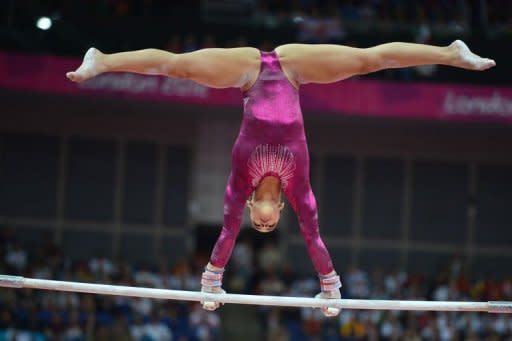Douglas delights as US dominance continues
Gabrielle Douglas boldly triumphed in the women's individual gymnastics final on Thursday to give the United States their third consecutive Olympic female champion. The 16-year-old from Virginia known as "The Flying Squirrel" also became the first black woman in history to lift the Olympics' most prestigious title with a scintillating performance at the North Greenwich Arena. Russia's Viktoria Komova took silver while Komova's team-mate Aliya Mustafina took bronze as Douglas followed in the footsteps of compatriots Carly Patterson in 2004 and Nastia Liukin, the 2008 champion. "It kinda hasn't sunk in yet. But it will though," she said. "A lot was going through my mind. I was just thinking that all the hard work had paid off. "I was speechless, just shedding tears of joy and waving to the crowd." It is Douglas' second gold medal at the London Games, after her role in the Americans' team success, while she will also compete in the uneven bars final on August 6 and the balance beam final on August 7. Douglas took the lead after the vault and held on to top spot despite a strong uneven bars routine from world champion Komova, before closing out victory with a remarkably composed display on the floor. Komova missed out on all-around gold to an American gymnast for the second major tournament in succession, having being pipped by Jordyn Wieber, who did not qualify for the Olympic final, at last year's World Championships. "I'm upset because I could have won gold, but I just didn't get it," said Komova. "I hoped my floor routine would be good enough." However Komova lavished praise on Douglas. "She's very strong," she said. "She performed beautifully today. She earned her gold medal as she has performed very well over a number of days." The four favourites -- Douglas and Aly Raisman of the USA, and Komova and Mustafina of Russia -- were placed in the same group and began on the vault. As in qualifying and in the team final, the American girls shone, producing near-faultless Amanar vaults -- a Yurchenko with two and a half twists -- that gave Douglas a score of 15.966 and Raisman 15.900. Komova stumbled badly on landing to receive a mark of 15.466, while Mustafina's score of 15.233 meant that the two American girls headed to the uneven bars with an early advantage. Komova is the reigning world uneven bars champion and her display on that apparatus yielded a score of 15.966 that momentarily took her up to second, but Douglas scored 15.733 to remain top at the halfway stage. Mustafina's gold medal ambitions died when she came off the balance beam in the third rotation, but Douglas scored 15.500 to stay ahead of Komova, to the audible delight of the many American fans in the crowd. Douglas did not put a foot wrong in her bold and brassy floor routine, but even though she was outscored by Komova moments later, it was not enough for the Russian to snatch the gold. Mustafina won bronze ahead of Raisman after their weakest scores were discarded, which left Mustafina with a score of 45.933 to Raisman's 45.366. "I was almost 100 percent sure that I wouldn't get a medal (after falling off the beam)," admitted Mustafina. "I saw that I had the same score as the American gymnast. I'm very happy with my medal." Raisman said she felt "proud" about Douglas' performance but admitted she was disappointed to have missed out on a medal by such a slender margin. "Of course it's a huge bummer but I'm still fourth in the world, so that's something to be proud of," she said.





